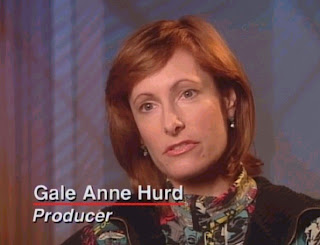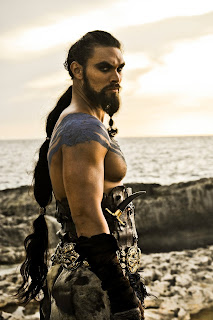Summer is a time for living dangerously and nowhere is life more dangerous than in the movies about gambling. Moviemaking is a recklessly expensive venture to begin with (CASINO cost $50 million, enough to build a casino in itself) and no investor/producer ever knows for sure that the film won't bomb and they'll lose it all, baby. It's a roll of the dice. And the mob's been associated one way or another with Hollywood since the beginning, from Al Capone's boys acting as technical advisors on the 1932 original SCARFACE to "this is the girl" in MULHOLLAND DR. Wherever there's big money and trade unions, the mob is there, and Hollywood has both, so rolling the dice on a film about the mob rolling dice on a plan to lure ducats out of America's pockets is so meta it can't fail... it's a sure thing baby, a hot tip, a combo blackjack table and funhouse room of mirrors.
And thanks to the internet, gambling isn't just limited to Vegas, as online poker lets you live the giddy rush of Vegas from your own home. Things are changing, and the criminal element can't keep up, which is why Scorsese's film looks back to the mobster version of Vegas' heyday, a tangent moment to the Rat Pack's OCEAN'S ELEVEN, which played up the glamour, drunkenness and class, but kept it light. If it's meant as a lark, perpetrated by attractive people, robbing a casino is far less evil, somehow, than the actual operation of one. CASINO is way different: Scorsese knows that to be a big winner in gambling is to keep your tells in check and your calculation of odds on point, ideally without cheating.
In other words, to be lucky at cards you must be unlucky at love--for love makes those things impossible. No one knows why except that some karmic law of averages is involved. Heartbreak and misery on the other hand, increases your luck. "You don't have a girl pining for you somewhere," a sharpie consoles William Demarest after winning all his schmeckles in LADY EVE, "that often explains it." He does (remember "So long, Lula - I'll send you a postcard.")
It's just the karmic law of averages, baby. So what in the end, is a priority for a wise guy? To keep his love life ever in shambles, intentionally (albeit unconsciously). Thus the career gambler invariably has to continually sabotage his chances at a happy love life, as Robert De Niro's character does in CASINO--marrying a hottie hustler who says up front she doesn't love him--in order to preserve his luck at cards. One hopes it's not just that he's too blind to his own lack of self-awareness, or compassion for others in the process. One hopes in vain. He really seems to think he'll change her feelings, will come around, but all he's doing is buying her off.
I've already covered the delights of Robert Altman's 1974 underseen CALIFORNIA SPLIT (here) but those were happy gamblers - in love with the thrill of riding a streak - and falling into despair as soon as they cash out. CASINO is the opposite, the view from the other side of the one-way mirror -- and the danger and exaltation of living in a 'paradise' designed by shady guys who think comped cocktails, air conditioning, prostitutes in tail feathers and Sinatra nightly constitutes real class. For them, Vegas is a playground where a regular guy can live the gangster arc of winning the world only to lose one's shirt, but on a small manageable scale (without jail or death at the end). Who wouldn't want that kind of rush, even if it's on a scale suited to their small potatoes lifestyle? Why else do we watch films about gangsters, if not for the vicarious thrills, the vicarious paranoia and the final dislodging from vicariousness--when the gangster dies, the credits roll, and we go scurrying out into the light and back to our daily grinds and loved ones, grateful to not be so lucky at cards after all? We're the gangster's fair-weather friends - there to share his glory, gone when it's time to face the music.
Giddy rushes aside, CASINO is fraught with problems, none more glaring than the shadow of its predecessor, GOODFELLAS. From the punchy wiseguy narration to the long tracking shots packed with period rock music and beautiful-ugly old Italian faces, the Scorsese aesthetic we all fell in love with is back, but there's been so many imitations in the interim it seems like Scorsese is just another schmuck imitating himself. Now Joe Pesci is now so typecast as the rabid animal the only way he can outdo his legendary role as Joey (see one of my very first-ever posts on Acidemic, 'That Joey, he's a wild one) is to up the shocking violence ante. Pesci doesn't drop the ball here so much as hold it so tight it deflates. He looks older and stockier, his make-up more orange (to indicate a desert tan?), his belly paunchier, his sneer flash frozen, like a Madame Tussaud piece swollen from being left too long in the vat. When he throws his massive tantrums he's not scary-fun like he was in GOODFELLAS, just alarming. He's as trapped by the irresistible momentum of Scorsese's period gangster rhythm as a fly on an express train. The force of the forward movement broadens him around the edges until he splats.
With the critics primed to dutifully if joylessly adore her all the while, Sharon Stone takes over the last chunk of the action, turning a sad vixen's shaking the bars of her cage marriage into a shrill and humorless bid for Oscar respectability. She's intense but the whole thing smacks of effort. Do you think Barbara Stanwyck ever 'tried' to blow us away with her raw force? She merely released what was always inside her, the tigress. Stanwyck knew that before she unleashed her raw tigress force her audience needed modulation, dynamics, some wit and warmth amidst the rock formations. Stone just wants us to see how Joan Crawfordianly hard she's trying. But hardness without softness, darkness without lightness, what is that? It might be Great Acting, but it's not riveting, more like watching a strange couple fighting at a restaurant -feeling only a mix of embarrassment, weariness and concern.
Whatever she's supposed to be conveying, it doesn't deserve the acres of tantrum space Scorsese carves out for it in the final act of CASINO. Verhoeven in BASIC INSTINCT and TOTAL RECALL knew how to use Stone's Bette Davis imperiousness and Jane Fonda insecurity combo as part of a comic book tapestry. He knew she was a delicious villainess rather than an 'identifiable' heroine. A director like Sidney Lumet or Nicholas Ray, or George Cukor might have helped Stone reign in some of her less successful ideas and enable her to win an Oscar, but without a genius who loves and can direct powerful women (and Scorsese is about as far from that as a great director can get), Stone falls into the same morass that snared Annette Bening in AMERICAN BEAUTY, the morass wherein female rage against the patriarchal machine comes out as abrasive, ineffectual spite, all while the infantile, unconsciously misogynistic director smiles and nods.
 |
| The Orangeman |
Whatever she's supposed to be conveying, it doesn't deserve the acres of tantrum space Scorsese carves out for it in the final act of CASINO. Verhoeven in BASIC INSTINCT and TOTAL RECALL knew how to use Stone's Bette Davis imperiousness and Jane Fonda insecurity combo as part of a comic book tapestry. He knew she was a delicious villainess rather than an 'identifiable' heroine. A director like Sidney Lumet or Nicholas Ray, or George Cukor might have helped Stone reign in some of her less successful ideas and enable her to win an Oscar, but without a genius who loves and can direct powerful women (and Scorsese is about as far from that as a great director can get), Stone falls into the same morass that snared Annette Bening in AMERICAN BEAUTY, the morass wherein female rage against the patriarchal machine comes out as abrasive, ineffectual spite, all while the infantile, unconsciously misogynistic director smiles and nods.
But it's no secret- everyone knows romance and female characters (ALICE aside) aren't Scorsese's strong point. He lives and breathes cigar smoke from the boys in the back room. His films about dangerous hoods work because he truly 'feels' the threat of violence, knows the texture of the mean streets, hires actual Little Italy characters (including his own mother) and makes effective, occasionally sickening, use of cattle prods, spittle, baseball bats and beatings. In the lengthy kinetic montage wherein De Niro's narration takes us through the process of the skim we're off into the blissful realm of pure cinema, and a solid hour of running time evaporates like crack, but we still have two hours to go and by the home stretch of the film, the woman has landed.
Try as I might I can never really give a shit about the fate of her marriage with De Niro's obsessive casino boss, so I spend these scenes admiring the elaborately gaudy outfits she wears, the fringe jacket and smoky blonde hair cuts as she angrily packs her suitcase and calls her old pimp (James Woods, 'lighting up' the screen) for emotional support. We only see the happy Sharon Stone in an initial slow mo montage of her strolling through the casino, tossing chips and duking parking attendants. The rest of the film she's moping by the phone, sobbing hysterically or otherwise chewing all available scenery in coke/booze-amped despair. Scorsese might have allowed us to see her happy and jubilant within the marriage itself once or twice, as opposed to merely doing her job posing like a trophy in public before collapsing into tantrums at home. Instead De Niro's schmuck of a casino manager doesn't even get the wan smile a legitimate john might earn, i.e. she won't even fake liking him. As one who makes a living on gambling, it's kind of odd that--even knowing the outcome from the start--he bets everything he has on Ginger to change her mind, and seems genuinely shocked when she doesn't like him any better even after having a kid.
Thus the only explanation for putting all his eggs in such a shitty basket might be that De Niro unconsciously figures being unlucky in love means being lucky at cards, so deliberately sabotaging any chance at happiness in his personal life ensures continued winning streaks.
Maybe he's right.
Try as I might I can never really give a shit about the fate of her marriage with De Niro's obsessive casino boss, so I spend these scenes admiring the elaborately gaudy outfits she wears, the fringe jacket and smoky blonde hair cuts as she angrily packs her suitcase and calls her old pimp (James Woods, 'lighting up' the screen) for emotional support. We only see the happy Sharon Stone in an initial slow mo montage of her strolling through the casino, tossing chips and duking parking attendants. The rest of the film she's moping by the phone, sobbing hysterically or otherwise chewing all available scenery in coke/booze-amped despair. Scorsese might have allowed us to see her happy and jubilant within the marriage itself once or twice, as opposed to merely doing her job posing like a trophy in public before collapsing into tantrums at home. Instead De Niro's schmuck of a casino manager doesn't even get the wan smile a legitimate john might earn, i.e. she won't even fake liking him. As one who makes a living on gambling, it's kind of odd that--even knowing the outcome from the start--he bets everything he has on Ginger to change her mind, and seems genuinely shocked when she doesn't like him any better even after having a kid.
Thus the only explanation for putting all his eggs in such a shitty basket might be that De Niro unconsciously figures being unlucky in love means being lucky at cards, so deliberately sabotaging any chance at happiness in his personal life ensures continued winning streaks.
Maybe he's right.
While Scorsese too is on a winning streak, for that great opening hour or two, in the end it's his do-no-wrong reputation that brings him low. Like the master gunfighter in the western where every hotshot snotnose with an iron on his hip wants to challenge him in order to build their own legends, every young punk out there imitates Scorsese, and as a result he's as insecure and second-guessing about his own genius as Malick or Kubrick, slowly losing touch with his nitty gritty acumen through the thick fog of his adoring legions, none of whom would dare point out when a scene is going to hell.
That's why CASINO is De Niro's last brilliant film, as well as the first of his bad ones. You can feel the gambler's luck turning halfway through, right around the time De Niro fires Joe Bob Briggs, nephew of a Nevada gaming commission bigwig, and refuses to even hire him back "somewhere farther down the trough," though the politician makes it clear De Niro's going to wind up losing his license if he doesn't comply. How did someone so smart get suddenly so stupid... twice? Why would De Niro fuck up a good thing with the gaming commission just by insisting on firing a dopey relative of a high end Nevada politician? De Niro then seems surprised when he loses his license appeal, just as he's surprised when Ginger tries to run away. It just doesn't fit that a schmuck this dumb would be smart enough to get so far in the first half of the film. He been takin' stoopid pills? He go to Vegas to get stupid?
By the same token, why did Marty think his next project after GOODFELLAS (and before CASINO) should be AGE OF INNOCENCE (1993)? I'm not saying one should never wander from his own back yard (though technically I guess he didn't), but if you can't find anything new to talk about within it, maybe your just not looking hard enough. The man who found Shakespeare within the language of a Brooklyn gangster movie doesn't need to do actual Shakespeare. What does he find, then, except that his fan base can be pushed just so fur and no further?
For a director who suddenly could do any project he wanted to decide to film some creaky Edith Wharton tale in a Merchant Ivory-just-with-more-elaborate-tracking-shots style is telling of Marty's deep-rooted insecurity and doomed drive for bourgeois respectability. Sure the film is great in its way, Daniel Day Lewis rocks it, but why not let the Brits do that posh shit? What made the clans of mobsters in early Scorsese so fun was their boorish blue collar philistinism version of wealth and power. Imagine if the first thing Henry Hill did with his newfound success was buy a box at the opera, a polo pony, and a subscription to The New York Times? Yuck. Sometimes the worst thing that can happen to an artist of the streets is success amongst the hoi polloi, resulting in the sudden ill-advised need to break into the one class of people who momentarily welcome you into their inner circle the way gangsters might a flush chump to their upstairs poker game. Like Sinatra angling for the slumming rich girl virgin instead of the adoring floozy in SOME CAME RUNNING, his grass-is-greener class envy is showing.
I can only presume that karmic law is still at work, sometimes the worst that can happen to a gambler is to win so big that no future jackpot can ever measure up. Surrounded by imitators trying to duplicate your winning formula, you eventually wind up imitating them and your comfort zone shrinks around you like a soaking wet straitjacket. Soon even the moon looks like just another cracked poker chip, and the electric pop style you invented through hard work and termite art genius seems as derivative as hell. CASINO is the proof Marty can't go home again. I can't even watch my old GOODFELLAS DVD anymore as it seems derivative and played to death (not unlike SILENCE OF THE LAMBS) thanks to BLOW, SNATCH, MASTER OF WAR, TRAINSPOTTING, AMERICAN GANGSTER, CHARLIE WILSON'S WAR, MIDDLE MEN (see "Gotta get the papez, get the papez" or Johnny Two TImes, Because He Said Everything Twice)
And that's that.



.jpg)



















































